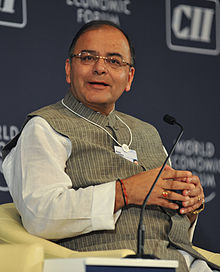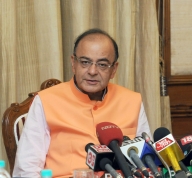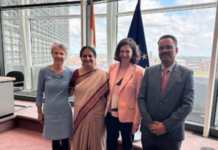Shanghai–Emerging markets and developing economies need to “judiciously mix fiscal, monetary and structural policies” to deal with the “heightened uncertainty, market volatility and risk-averse behaviour” caused in wake of Brexit, India has said.
“Brexit has further heightened uncertainty, market volatility and risk-averse behaviour. Governments, central banks and regulators have to mitigate the pressure of such vulnerabilities through judicious mix of fiscal, monetary and structural policies,” Indian Finance Minister Arun Jaitley said in a message at the first annual meeting of the board of governors of New Development Bank (NDB) of BRICS (Brazil, Russia, India, China and South Africa).
The message was delivered by Indian Finance Ministry Joint Secretary, Raj Kumar, who was representing Jaitley at the meeting.
During the meeting on Wednesday, it was decided that India will be the chair of the board of governors of the NDB Bank and host its second annual meeting in 2017.

Jaitley in his message termed the current global economic scenario as “far from robust” and is marked by a modest pickup in some advanced economies from their low levels of growth.
Decline in growth in emerging market and developing economies, increased financial sector volatility and, in general, a downward revision of global growth projections by the International Monetary Fund, are the challenges that lie ahead, he said.
IMF has revised down its forecast for global growth in 2016 and 2017 in view of the uncertainty surrounding Britain’s exit from the European Union. It expects the global economy to grow 3.1 per cent in 2016 and 3.4 per cent in 2017, both 0.1 per cent lower than its forecasts in April.
“The structural problems of Emerging Markets and Developing Economies (EMDEs) continue to affect their growth. The sluggish global trade and low commodity prices have also adversely affected commodity-exporting EMDEs, by aggravating their corporate and other economic vulnerabilities,” he said.
India, has been following the approach of ‘Reform to Transform’ through far reaching structural reforms, he said, listing out initiatives taken to boost investment climate and improve the ease of doing business like the National Infrastructure Investment Fund, the recently-passed Insolvency and Bankruptcy Code 2016 as well as Make in India, Start-up India, and Skill India.
“The Indian government has launched a massive financial inclusion programme. More than 200 million bank accounts have been opened for the unbanked persons. We are now using Aadhaar, a unique identification system with statutory backing, as backbone for targeted delivery of financial and other subsidies, benefits and service,” he added.







